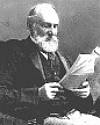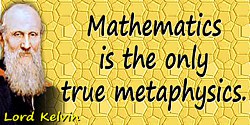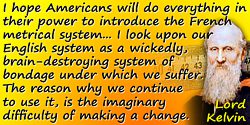 (source)
(source)
|
Baron William Thomson Kelvin
(26 Jun 1824 - 17 Dec 1907)
Irish physicist, mathematician and engineer , born as William Thomson in Ireland, he became an influential physicist, mathematician and engineer who has been described as the Newton of his era.
|
William Thomson Kelvin
“Science is not antagonistic to religion”
Illustrated Quote - Medium (500 x 250 px)
More William Thomson Kelvin quotes on science >>
Lord Kelvin was presiding at a lecture by Professor Henslow on “Present Day Rationalism,” before the University College Christian Association in London. When the speaker was closing his talk, he stated that modern science neither affirms nor denies creative power in the origin of life. According to an account in the magazine The Dolphin (Jul 1903), to this Kelvin
‘replied with some warmth that science does and must positively affirm creative power since biology makes every one feel the miracle of life in himself.
He said that modern biologists are coming once more to complete acceptance of a vital principle as the source of vital phenomena. He asked:
“Is there anything so absurd as to believe that a number of atoms falling together of their own accord can by any chance make a sprig of moss, a microbe or a living animal? Nobody can think that any such process even in millions and millions of years could unaided give us a beautiful world like ours?”
He added,
“Let nobody be afraid of true freedom of thought. Let us be free in thought and criticism, but with freedom we are bound to come to the conclusion that science is not antagonistic, but is a help to religion."
Lord Kelvin closed his brief but weighty confession of faith with this striking passage:
“Forty years ago I asked Liebig walking somewhere in the country, if he believed that the grass and flowers which we saw around us grew by mere chemical force. He answered no, I believe it no more than I could believe that a book of botany describing them could grow by mere chemical force.”
One of Lord Kelvin's expressions is,
“Every action of the human free-will is a miracle to physical, and chemical, and mathematical science.” ’
Webmaster has not been able to identify which newspaper may have been the primary source of the quote, but it is confirmed by a narrative version of Kelvin's statements that appeared in the New York Times (14 May 1903).1 Kelvin’s remarks continued to be quoted in various religious publications2 in the following two decades.
2 For example, Arthur Holmes, 'The Faith of the Scientist' in The Biblical World (1916), 48, 7.
- Science Quotes by Baron William Thomson Kelvin.
- 26 Jun - short biography, births, deaths and events on date of Kelvin's birth.
- Lord Kelvin Biography - one of the earliest pages written for this site.
- A Kelvin Biography - with more background on Kelvin’s early scholarship in mathematics and his life’s work, from Famous Men of Science.
- William Thomson Kelvin - context of quote “Make a mechanical model” - Medium image (500 x 250 px)
- William Thomson Kelvin - context of quote “Make a mechanical model” - Large image (800 x 400 px)
- William Thomson Kelvin - context of quote “Many of the greatest advances” - Medium image (500 x 250 px)
- William Thomson Kelvin - context of quote “Many of the greatest advances” - Large image (800 x 400 px)
- William Thomson Kelvin - context of quote “The rewards of accurate measurement” - Medium image (500 x 250 px)
- William Thomson Kelvin - context of quote “The rewards of accurate measurement” - Large image (800 x 400 px)
- William Thomson Kelvin - context of quote “I have no satisfaction in formulas” - Medium image (500 x 250 px)
- William Thomson Kelvin - context of quote “I have no satisfaction in formulas” - Large image (800 x 400 px)
- William Thomson Kelvin - context of quote “Mathematics is … etherealisation of common sense” - Medium image (500 x 250 px)
- William Thomson Kelvin - context of quote “Mathematics is … etherealisation of common sense” - Large image (800 x 400 px)
- William Thomson Kelvin - context of quote “Measure … and express in numbers” - Medium image (500 x 250 px)
- William Thomson Kelvin - context of quote “Measure … and express in numbers” - Large image (800 x 400 px)
- William Thomson Kelvin - context of quote “Imaginary difficulty of making a change” - Medium image (500 x 250 px)
- William Thomson Kelvin - context of quote “Imaginary difficulty of making a change” - Large image (800 x 400 px)
- William Thomson Kelvin - context of quote “Questions of personal priority” - Medium image (500 x 250 px)
- William Thomson Kelvin - context of quote “Questions of personal priority” - Large image (800 x 400 px)
- William Thomson Kelvin - context of quote “Science is not antagonistic to religion” - Large image (800 x 400 px)
- William Thomson Kelvin - context of quote “Simplification of modes of proof” - Medium image (500 x 250 px)
- William Thomson Kelvin - context of quote “Simplification of modes of proof” - Large image (800 x 400 px)
- William Thomson Kelvin - context of quote “Mathematics is the only true metaphysics” - Medium image (500 x 250 px)
- William Thomson Kelvin - context of quote “Mathematics is the only true metaphysics” - Large image (800 x 400 px)
- Excellent Kelvin Biography history at the BBC education site for the Local Heroes TV series.
- Construction details for "Kelvin's Thunderstorm" - Lord Kelvin's water-drop electrostatic generator..
- Kelvin at three different ages - a photo gallery across his life.
- Collection of pictures of Kelvin at different ages - at the MacTutor site.
- Informative Biography of Kelvin - with additional resources at the MacTutor site.
- History of Submarine Cables - a 150 Year History of Submarine Cables.
- Timeline of Atlantic Cables - 1856 to 2015.
- Lord Kelvin's Conjecture Disproved - A modern improvement on Kelvin's 1887 geometrical conjecture.
- Degrees Kelvin: A Tale of Genius, Invention, and Tragedy, by David Lindley. - book suggestion.
- Booklist for William Thomson.








